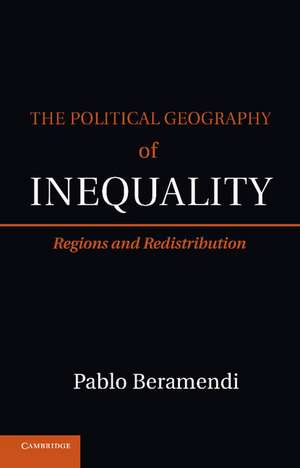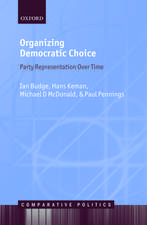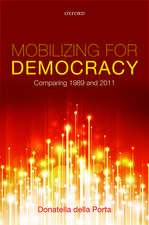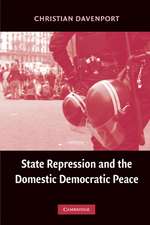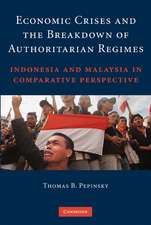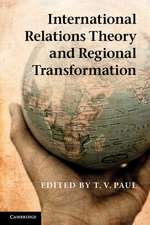The Political Geography of Inequality: Regions and Redistribution: Cambridge Studies in Comparative Politics
Autor Pablo Beramendien Limba Engleză Paperback – 4 iun 2014
| Toate formatele și edițiile | Preț | Express |
|---|---|---|
| Paperback (1) | 289.39 lei 6-8 săpt. | |
| Cambridge University Press – 4 iun 2014 | 289.39 lei 6-8 săpt. | |
| Hardback (1) | 721.85 lei 6-8 săpt. | |
| Cambridge University Press – 25 mar 2012 | 721.85 lei 6-8 săpt. |
Din seria Cambridge Studies in Comparative Politics
-
 Preț: 179.15 lei
Preț: 179.15 lei -
 Preț: 267.61 lei
Preț: 267.61 lei -
 Preț: 239.36 lei
Preț: 239.36 lei - 9%
 Preț: 594.67 lei
Preț: 594.67 lei -
 Preț: 160.82 lei
Preț: 160.82 lei -
 Preț: 269.58 lei
Preț: 269.58 lei -
 Preț: 264.74 lei
Preț: 264.74 lei -
 Preț: 177.28 lei
Preț: 177.28 lei -
 Preț: 225.70 lei
Preț: 225.70 lei -
 Preț: 164.94 lei
Preț: 164.94 lei -
 Preț: 236.42 lei
Preț: 236.42 lei -
 Preț: 185.64 lei
Preț: 185.64 lei -
 Preț: 233.13 lei
Preț: 233.13 lei -
 Preț: 206.71 lei
Preț: 206.71 lei -
 Preț: 231.82 lei
Preț: 231.82 lei -
 Preț: 206.52 lei
Preț: 206.52 lei -
 Preț: 201.24 lei
Preț: 201.24 lei -
 Preț: 358.37 lei
Preț: 358.37 lei -
 Preț: 203.42 lei
Preț: 203.42 lei -
 Preț: 232.45 lei
Preț: 232.45 lei -
 Preț: 257.82 lei
Preț: 257.82 lei -
 Preț: 191.12 lei
Preț: 191.12 lei -
 Preț: 158.77 lei
Preț: 158.77 lei -
 Preț: 199.05 lei
Preț: 199.05 lei - 11%
 Preț: 553.80 lei
Preț: 553.80 lei - 11%
 Preț: 695.06 lei
Preț: 695.06 lei -
 Preț: 288.80 lei
Preț: 288.80 lei -
 Preț: 262.06 lei
Preț: 262.06 lei - 11%
 Preț: 691.66 lei
Preț: 691.66 lei -
 Preț: 388.29 lei
Preț: 388.29 lei -
 Preț: 288.04 lei
Preț: 288.04 lei -
 Preț: 228.00 lei
Preț: 228.00 lei -
 Preț: 385.28 lei
Preț: 385.28 lei -
 Preț: 312.89 lei
Preț: 312.89 lei -
 Preț: 224.44 lei
Preț: 224.44 lei -
 Preț: 287.07 lei
Preț: 287.07 lei -
 Preț: 251.27 lei
Preț: 251.27 lei -
 Preț: 313.70 lei
Preț: 313.70 lei -
 Preț: 277.38 lei
Preț: 277.38 lei -
 Preț: 423.79 lei
Preț: 423.79 lei - 11%
 Preț: 552.94 lei
Preț: 552.94 lei - 11%
 Preț: 554.43 lei
Preț: 554.43 lei - 14%
 Preț: 783.26 lei
Preț: 783.26 lei
Preț: 289.39 lei
Nou
Puncte Express: 434
Preț estimativ în valută:
55.38€ • 57.93$ • 46.00£
55.38€ • 57.93$ • 46.00£
Carte tipărită la comandă
Livrare economică 02-16 aprilie
Preluare comenzi: 021 569.72.76
Specificații
ISBN-13: 9781107637214
ISBN-10: 110763721X
Pagini: 318
Ilustrații: 37 b/w illus. 35 tables
Dimensiuni: 156 x 234 x 18 mm
Greutate: 0.49 kg
Editura: Cambridge University Press
Colecția Cambridge University Press
Seria Cambridge Studies in Comparative Politics
Locul publicării:New York, United States
ISBN-10: 110763721X
Pagini: 318
Ilustrații: 37 b/w illus. 35 tables
Dimensiuni: 156 x 234 x 18 mm
Greutate: 0.49 kg
Editura: Cambridge University Press
Colecția Cambridge University Press
Seria Cambridge Studies in Comparative Politics
Locul publicării:New York, United States
Cuprins
1. Regions and redistribution: introduction and overview; 2. A theory of fiscal structures in political unions; 3. The road ahead: the empirical strategy; 4. The European Union: economic geography and fiscal structures under centrifugal representation; 5. North America's divide: distributive tensions, risk sharing, and the centralization of public insurance in federations; 6. Germany's reunification: distributive tensions and fiscal structures under centripetal representation; 7. Endogenous decentralization and welfare resilience: Spain, 1978–2007; 8. The political geography of inequality: summary and implications.
Recenzii
"Across the world, federations and quasi-federations come in all shapes and sizes. Their welfare and redistributive consequences are also strikingly different. In this terrific, sophisticated, agenda-setting book, Pablo Beramendi explains why. The Political Geography of Inequality is a must-read."
Carles Boix, Princeton University
"By integrating the study of inequality with the study of federalism this ambitious book casts new light on both. The theoretical synthesis Beramendi proposes helps explain such diverse phenomena as why some countries and regions are better able to respond to economic shocks, why some countries can sustain higher levels of redistribution and equality, and why it is so difficult for currency unions like the Eurozone to succeed. The book is a remarkable achievement that will have a major impact on the field of comparative political economy for years to come."
Torben Iversen, Harvard University
"The design of fiscal unions is a topic of central importance not only in Europe but in all countries with some degree of local autonomy. In a methodologically sophisticated analysis, Beramendi destroys several stereotypes according to which local autonomy must be associated with a high degree of individual inequality. This is an eye-opening contribution."
Adam Przeworski, New York University
Carles Boix, Princeton University
"By integrating the study of inequality with the study of federalism this ambitious book casts new light on both. The theoretical synthesis Beramendi proposes helps explain such diverse phenomena as why some countries and regions are better able to respond to economic shocks, why some countries can sustain higher levels of redistribution and equality, and why it is so difficult for currency unions like the Eurozone to succeed. The book is a remarkable achievement that will have a major impact on the field of comparative political economy for years to come."
Torben Iversen, Harvard University
"The design of fiscal unions is a topic of central importance not only in Europe but in all countries with some degree of local autonomy. In a methodologically sophisticated analysis, Beramendi destroys several stereotypes according to which local autonomy must be associated with a high degree of individual inequality. This is an eye-opening contribution."
Adam Przeworski, New York University
Descriere
This is a book about redistribution and inequality in political unions.
